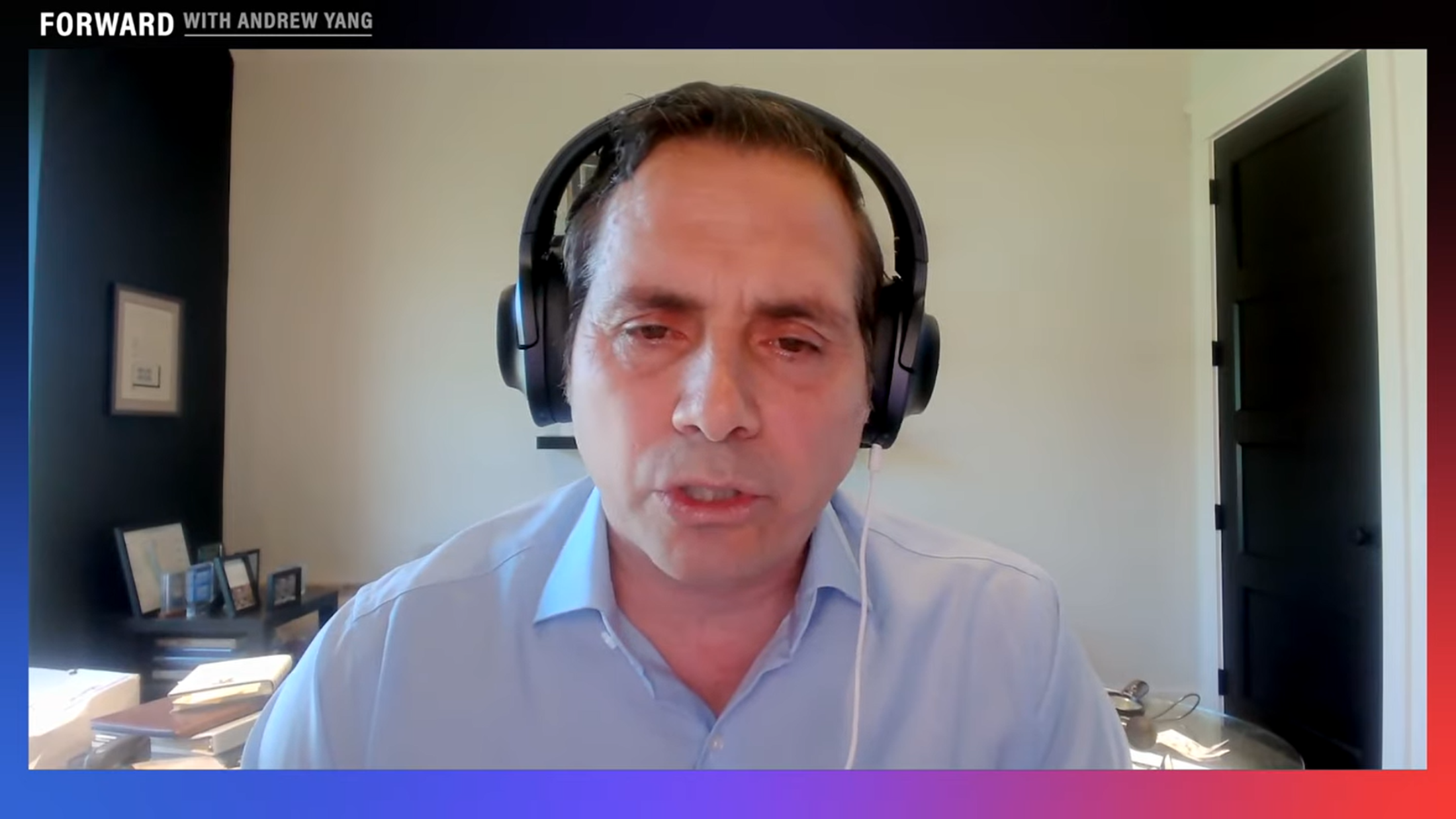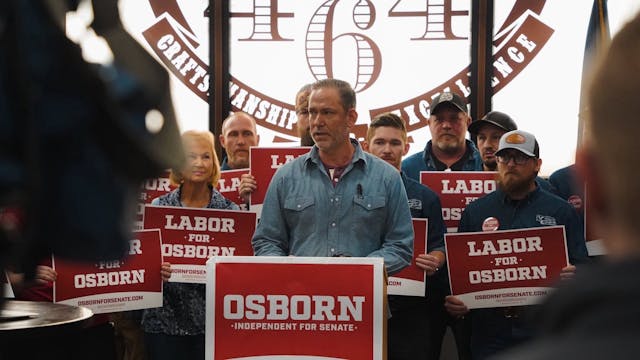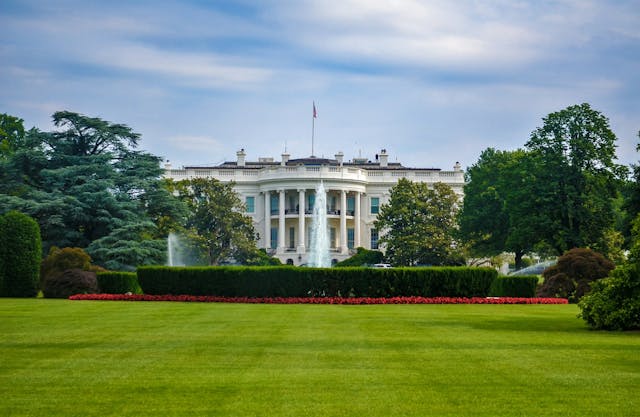Greg Orman: The Independent Who Got 42% of the Vote Against an Incumbent in Kansas

Can an independent candidate be viable in US elections? While the parties and the media want people to believe the answer is an emphatic no. There is one independent in Kansas who has already proven the naysayers wrong.
His name is Greg Orman, an entrepreneur, author, and public figure who has run two statewide campaigns in Kansas. Former presidential candidate Andrew Yang recently sat down with him to talk about his journey in independent politics.
Orman is a unique figure. There are not many independent candidates who have faced off against a major party candidate, especially an incumbent Republican in a state like Kansas, and garnered over 40% of the vote.
But he did.
In 2014, Orman ran for US Senate in Kansas, despite people close to him telling him there was no way he could win. The election started out as a three-person race between Orman, US Sen. Pat Roberts, and Democrat Chad Taylor.
Taylor dropped out of the race in September -- setting up a one-on-one contest between Orman and Roberts, even as then Republican Secretary of State Kris Kobach tried to force the Democrat's name to stay on the ballot.
Faced against an independent challenger, the party establishment felt threatened. So threatened that Republicans fought to keep a Democrat on the ballot.
Greg Orman: Independents Must Be The Life Raft in a Sinking Two-Party System
In a rare turn of events, the media was forced to cover an independent campaign. Orman got to talk directly to Kansans about their needs and what he could do for them. He ran on a platform of fiscal responsibility and social tolerance.
He also garnered endorsements from Republican and Democratic groups, officials, and former lawmakers. His opponents, however, took the two-man race as an opportunity to paint him as a Democrat.
If a candidate isn't a Republican, they have to be a Democrat (and vice versa) -- or at least that is how the partisan narrative is spun. This is something that Orman believes ultimately hurt his campaign.
"We ended up losing by a greater margin than we were behind [in the polls] on Labor Day before the Democrat dropped out," he told Yang. He added that his campaign could have flipped the "spoiler" argument against Taylor if he stayed in the race because Orman polled higher.
He came close -- and though he didn't win his candidacy highlighted the viability of independent candidates.
The Dangerous and Flawed 'Wasted Vote' Argument
Orman ran in a statewide election again in 2018. This time for governor. However, unlike the Senate race, Orman faced Democrat Laura Kelly and Republican Kris Kobach in a tight race.
Voters have been conditioned to think in terms of lesser of two evils -- by the press, by the parties, and by politicians. The electoral narrative is about targeting people's fears and exploiting them to get the desired outcome.
This provides a foundation for the "spoiler" and "wasted vote" arguments people are used to hearing when independent and third-party candidates are brought up. Orman got plenty of exposure to this mindset.
He told Yang he would talk to a voter sitting at a table who said they would vote for him, but they don't want Kris Kobach to win. Then, someone at the same table said the same, except they didn't want Laura Kelly to win.
They felt forced to vote for Kelly or Kobach to prevent the other from winning. "What I said to both of them is, why don't you both agree to vote for me, and you will cancel out the other concern," Orman said.
"We have all seen this movie before," Yang remarked. "I have to make sure the person I am very scared of or hate does not win -- so I will vote with the blue team or the red team."
It all comes down to how voters have been conditioned to think about independent candidacies.
Orman pointed out that the "wasted vote" argument is flawed. He said when confronted with it he likes to point out that a person has a greater chance of getting struck by lightning twice than being the deciding vote in an election.
"In the history of America, there has only been one statewide race -- it was about 180 years ago -- decided by a single vote," he said.
From that standpoint alone, there is no reason why anyone should give up their vote out of fear of wasting it. Orman believes what makes a vote important is it is an expression of who a voter is and what they value.
"We spend so much time voting to minimize our maximum regret," he explained. "We vote against candidates we hate and we fear instead of voting for candidates who we love or who inspire us."
One must ask, is that not more of a wasted vote?
The "wasted vote" narrative has serious implications on national politics. A candidate doesn't need to worry about upholding the promises they make on the campaign trail. They don't need to worry about what policies they pursue.
The only thing they need to do to win and keep winning is make sure voters fear the "other side." It is the "vote for me and my team or doom!" mentality.
Orman also pointed out the double standard that exists when the national press constantly pushes this narrative about independents.
"We never hear the media say to the Biden voter in Alabama, 'you're wasting your vote,'" he said. "But the reality is a Biden voter in Alabama is not going to get Biden elected."
The same can be said for Trump voters in California -- because these are "winner-takes-all" states that are what Yang calls "foregone conclusions" for one side or the other.
We already know who is going to take Alabama in the 2024 general election. We know who is going to take California. The losing side in these states has zero impact on the outcome of the presidential election.
But no one tells the people who vote for the losing party that they are wasting their vote. The only time voters hear the press talk about wasted votes in when they talk about independent and third-party candidates.
Why Run as An Independent?
"At the end of the day, my goal was to make sure partisans everywhere knew they could not go to Washington and just hide behind their party. They had to solve problems for the American people," Orman remarked.
And he showed it can be done. An independent candidacy can get people thinking and talking about the problems that exist under the current system, and the lack of accountability and representation present.
Even if the campaign doesn't ultimately win.
Many voters want an alternative option to the Republican and Democratic Parties. Orman said when he polled Roberts' voters in the Senate race, two-thirds of them said he was the better candidate.
But when he inquired further into why these voters felt they needed to stick with Roberts, they said a Republican Senate was needed because they were promised things that ultimately had no follow through.
Orman told them "I think what you want is smarter, more efficient government. You're not going to get that with gridlock."
"If you want smarter, more efficient government, you have to send a message to both parties that they need to work together."
When voters think they need one party to control the House or Senate, it reinforces the notion that partisan candidates don't need to get anything done. They just need to be from the right party and make voters afraid of the other party.
"I don't think we have strong partisans anymore. I think we have strong anti-partisans," Orman said. "They don't love their own party. They hate and fear the other party so much that they support their party -- and that's a bridge to nowhere."
These conversations won't happen on the campaign trail unless independent campaigns are willing to step up. Without candidates like Orman, the only narrative voters will hear is what the duopoly wants them to hear.
There are many potential candidates who would love to run as an independent, but they allow the "spoiler" and "wasted vote" narratives to stop them.
"One of the things I discovered about independent politics is what I describe in my book as a 'gravitational pull,'" Orman said. "Because there is this belief that independents can't win, so many voters don't consider independent candidacies or take them seriously."
"But if you can break through that gravitational pull, you can get enough public support that people start to think, 'Hey, wait a minute, maybe this person can win.' Then, that group of people -- which is about 60% of Americans -- starts to reconsider their choices."
And all it takes is one candidate. One candidate to breakthrough. One candidate who is authentic, committed to problem solving, and willing to face the hurdles the two-party duopoly puts in front of them.
Orman believes independent candidates owe it to future generations to at least try, even if they fail. People will stumble. People will make mistakes. But there is not a problem facing the country today that will be solved by doing nothing.
"Until the problems that face me are solved, I think I have a moral obligation and an obligation to future generations to go out there and do my best to try to solve it, even in the face of what might seem to be pretty daunting odds."
Check out the full conversation between Andrew Yand and Greg Orman above.
 Shawn Griffiths
Shawn Griffiths


